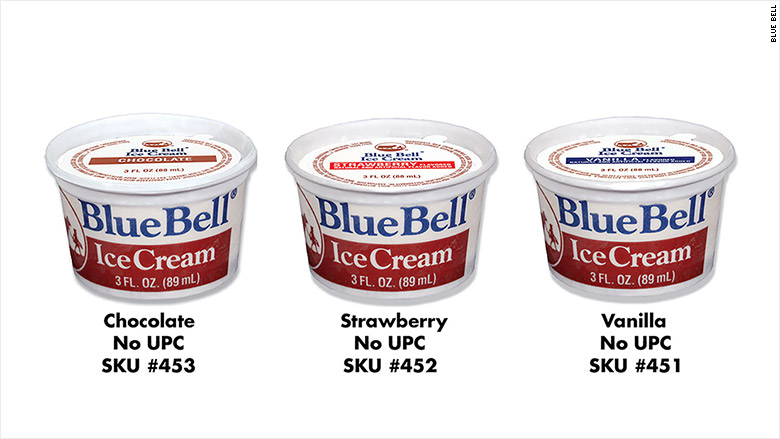
Blue Bell Creameries has expanded an ongoing recall of ice cream after a serving produced at a facility in Oklahoma tested positive for listeria contamination.
The company said Tuesday it is recalling pints of Banana Pudding Ice Cream and other products that were made at its facility in Broken Arrow, Okla., which was shut down last week "out of an abundance of caution."
The recall also covers six flavors of ice cream made at the plant that can be identified by their code date. (More information can be found here).
The flavors include butter crunch, mint chocolate chip, cookies 'n cream, homemade vanilla, dutch chocolate and moo-ilennium crunch. In addition, Blue Bell is recalling 3 oz. cups, pints and quarts of sherbert, in flavors such as rainbow, orange and mixed berry.
It's also recalling a few half-gallon sizes, including pistachio almond, homemade vanilla and homemade vanilla light.
Blue Bell said it shipped the products to grocery stores and markets, as well as food service companies, in more than 20 U.S. states.
The ice cream maker said the products "have the potential to be harmful to young children, frail or elderly people, and others with weakened immune systems." Healthy adults are at risk of short-term symptoms such as fever, headache and diarrhea, among other things. Listeria infection can also cause miscarriages and stillbirths in pregnant women.
Related: Kraft recalls 242,000 cases of mac and cheese for metal pieces
Last week, the Centers for Disease Control and Prevention warned consumers not to eat any Blue Bell-branded products made at the company's Broken Arrow plant. That includes 3-ounce servings of Blue Bell ice cream from this plant that went to institutions in containers marked with the letters O, P, Q, R, S or T behind the coding date.
The warning does not affect other Blue Bell ice cream not made at the plant. But Blue Bell has recalled other products.
It is the fourth time Blue Bell has taken action in light of a listeria outbreak at a Kansas hospital that served the company's ice cream.

Listeria at the plant
Listeria monocytogenes was recently found in a cup of ice cream recovered from the hospital.
The cup contaminated with the bacteria was produced at the Broken Arrow plant in April 2014, Blue Bell said. And, according to the CDC, listeria bacteria was found in additional samples of the same product that were recovered from the plant.
Related: GNC boosts quality control of herbal supplements
The bacteria in the hospital sample and the factory sample appeared to match each other genetically, the CDC said. But they did not appear identical to listeria samples taken from patients infected in the Kansas outbreak.
In a separate outbreak in Texas, the CDC did find that listeria samples taken from patients who came down with listeriosis between 2010 and 2014 in a hospital that served 3-ounce Blue Bell cups matched the listeria in recovered samples.
None of this means the ice cream is the source of either spate of the infections.
Recall from Texas plant
In early March, in light of the Kansas listeria outbreak, Blue Bell recalled a group of products made at a plant in Texas. It later added 3-ounce cup servings to the recall.
Five people were infected and three died in the past year in Kansas from listeria that might be linked to Blue Bell Creameries products, according to the CDC.
All five of them were hospitalized at the same hospital before developing listeriosis, the CDC said. At least four of them had consumed milkshakes made with Blue Bell ice cream before developing the infection.
The CDC advises that individuals and institutions should check their freezers for the recalled products and throw them away.
Related: KFC tests edible coffee cups
Blue Bell has said the recall "in no way includes Blue Bell ice cream half gallons, pints, quarts, 3 gallons or other 3 oz. cups."
This has been the first product recall in the 108-year history of Blue Bell Creameries, according to the company.
What is listerosis?
Listeriosis is a serious infection caused by eating food contaminated with listeria, and primarily affects the elderly, pregnant women, newborns and people with weakened immune systems, according to the CDC.
Symptoms of a listeria infection are fever and muscle aches, sometimes associated with diarrhea or other gastrointestinal symptoms.
In the United States, an estimated 1,600 people become seriously ill each year, and approximately 16% of these illnesses result in death. Cervical infections caused by listeriosis in pregnant women may result in stillbirth or spontaneous abortion during the second or third trimesters.
-- CNN's Ben Brumfield and Catherine Shoichet contributed to this report.
